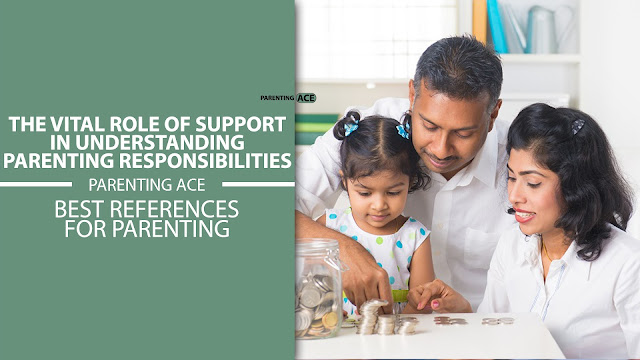The Crucial Role of Support in Understanding Parenting Responsibilities
In the intricate tapestry of parenting, support emerges as a vital thread binding together the fabric of familial well-being and child development. Welcome to our blog post where we embark on an exploration of the profound significance of support within the realm of understanding parenting responsibilities. From the nurturing embrace of emotional support to the practical assistance that lightens the load of daily tasks, we unravel the layers of support's impact on both parents and children. Join us as we delve into the transformative power of support networks, the types of support crucial for parenting success, and practical strategies for cultivating a supportive parenting environment that fosters resilience, growth, and thriving familial relationships.
 |
| The Vital Role of Support in Understanding Parenting Responsibilities |
Parenting, arguably one of life's most profound experiences, entails a multitude of responsibilities that shape the course of a child's journey from infancy to adulthood. Among these responsibilities, the role of support stands out as fundamental in nurturing healthy parent-child relationships and fostering positive development. In this article, we delve into the significance of support within the realm of understanding parenting responsibilities, exploring its various forms, its impact on both parents and children, and practical strategies for cultivating a supportive parenting environment.
The Importance of Support
Support in parenting encompasses emotional, practical, and social assistance provided to both parents and children. It serves as a cornerstone for effective parenting by offering a nurturing environment where children feel valued, understood, and secure. For parents, support acts as a vital resource in managing the myriad challenges and stresses that come with raising children. Whether it's a listening ear from a friend, guidance from a mentor, or assistance from community resources, support plays a pivotal role in bolstering parental confidence and resilience.
Types of Support
- Emotional Support: Emotional support entails empathy, validation, and encouragement provided to parents as they navigate the ups and downs of parenthood. This form of support can come from partners, family members, friends, or support groups, offering a safe space for parents to express their feelings, fears, and frustrations without judgment.
- Practical Support: Practical support involves tangible assistance with everyday tasks such as childcare, household chores, or errands. This type of support can alleviate the burden on parents, especially during times of stress or overwhelm. Whether it's a neighbor offering to babysit for a few hours or a family member helping with meal preparation, practical support can provide much-needed relief for busy parents.
- Social Support: Social support encompasses connections within communities, whether it's through parent groups, religious organizations, or cultural networks. These social connections offer opportunities for parents to share experiences, seek advice, and build friendships with others facing similar challenges. Additionally, social support can help combat feelings of isolation and loneliness, promoting overall well-being for both parents and children.
The Impact of Support on Parenting
Research consistently highlights the positive impact of support on parenting practices and child outcomes. Parents who receive adequate support report lower levels of stress, increased confidence in their parenting abilities, and greater satisfaction with their familial relationships. Moreover, children raised in supportive environments tend to exhibit higher levels of emotional intelligence, resilience, and social competence.
Practical Strategies for Cultivating Supportive Parenting
- Build a Support Network: Actively seek out supportive relationships with family members, friends, neighbors, and community organizations. Attend parenting classes, support groups, or online forums to connect with other parents facing similar challenges.
- Communicate Openly: Foster open communication with your partner, children, and support network. Express your needs, concerns, and emotions honestly, and be receptive to feedback and advice from others.
- Prioritize Self-Care: Take time to prioritize self-care and personal well-being. Engage in activities that replenish your energy and reduce stress, whether it's exercise, meditation, or hobbies you enjoy.
- Seek Professional Help When Needed: Don't hesitate to seek professional support from therapists, counselors, or healthcare providers if you're struggling with parenting-related issues such as postpartum depression, marital conflicts, or behavioral challenges with your child.
In conclusion, support plays a pivotal role in understanding and fulfilling the responsibilities of parenting. By cultivating a supportive environment that nurtures both parents and children, we can create the foundation for healthy parent-child relationships, optimal child development, and overall family well-being. Let us recognize the importance of support in parenting and strive to build resilient, connected communities where every parent feels empowered and every child thrives.



Comments
Post a Comment